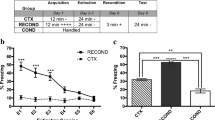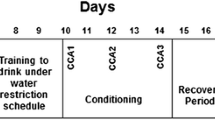Abstract
In rats, ethanol increases the latency of the tail-flick reflex to radiant heat. Three experiments examined the contribution of classical conditioning to the acquisition of tolerance to this antinociception. Experiment 1 showed that the antinociception produced by ethanol was dose dependent. The results of Experiment 2 demonstrated that rats exposed to a series of ethanol injections paired with a distinctive environment developed tolerance to this antinociception. In Experiment 3, tolerance was more pronounced in animals that had been exposed to ethanol and tested in the distinctive environment than in animals that had received ethanol in a nondistinctive environment. In contrast to previous reports in the literature, these results show that animals need not practice the tail-flick reflex while intoxicated in order to develop tolerance. Additionally, the data suggest that classical conditioning may contribute to tolerance to the antinociceptive effects of ethanol.
Similar content being viewed by others
References
Baker TB, Tiffany ST (1985) Morphine tolerance as habituation. Psychol Rev 92:78–108
Chen CS (1968) A study of the alcohol-tolerance effect and an introduction of a new behavioral technique. Psychopharmacologia 12:433–440
Chen CS (1972) A further note on studies of acquired behavioral tolerance to alcohol. Psychopharmacologia 27:265–274
Crowell CR, Hinson RE, Siegel S (1981) The role of conditioned drug responses in tolerance to the hypothermic effects of ethanol. Psychopharmacology 73:52–54
Dafters R, Bach L (1985) Absence of environmental-specificity in morphine tolerance acquired in non-distinctive environments: habituatation or stimulus overshadowing. Psychopharmacology 87:101–106
Jørgensen HA, Hole K (1981) Does ethanol stimulate brain opiate receptors? Studies on receptor binding and naloxone inhibition of ethanol-induced effects. Eur J Pharmacol 75:223–229
Jørgensen HA, Hole K (1984) Learned tolerance to ethanol in the spinal cord. Pharmacol Biochem Behav 20:789–792
Jørgensen HA, Berge OG, Hole K (1985) Learned tolerance to ethanol in a spinal reflex separated from supraspinal control. Pharmacol Biochem Behav 22:293–295
Jørgensen HA, Fasmer OB, Hole K (1986) Learned and pharmacologically-induced tolerance to ethanol and cross-tolerance to morphine and clonidine. Pharmacol Biochem Behav 24:1083–1088
Le AD, Poulos CX, Cappell H (1979) Conditioned tolerance to the hyperthermic effect of ethyl alcohol. Science 206:1109–1110
LeBlanc AE, Gibbons RJ, Kalant H (1973) Behavioral augmentation of tolerance to ethanol in the rat. Psychopharmacologia 30:117–122
LeBlanc AE, Gibbons RJ, Kalant H (1975) Generalization of behaviorally augmented tolerance to ethanol and its relation to physical dependence. Psychopharmacologia 44:241–246
Mansfield JG, Cunningham CL (1980) Conditioning and extinction of tolerance to the hypothermic effect of ethanol in rats. J Comp Physiol Psychol 94:962–969
Melchior CL, Tabakoff B (1981) Modification of environmentally cued tolerance to ethanol in mice. J Pharmacol Exp Ther 219:175–180
Melchior CL, Tabakoff B (1982) Environmental-dependent tolerance to the lethal effects of ethanol. Alcohol: Clin Exp Res 6:306–311
Melchior CL, Tabakoff B (1985) Features of environmental-dependent tolerance to ethanol. Psychopharmacology 87:94–100
Siegel S (1975) Evidence from rats that morphine tolerance is a learned response. J Comp Physiol Psychol 89:498–506
Siegel S (1977) Morphine tolerance acquisition as an associative process. J Exp Psychol: [Anim Behav] 3:1–13
Siegel S, Sdao-Jarvie K (1986) Attenuation of ethanol tolerance by a novel stimulus. Psychopharmacology 88:258–261
Tabakoff B, Melchior CL, Hoffman PL (1982) Commentary on ethanol tolerance. Alcohol: Clin Exp Res 6:252–259
Tiffany ST, Baker TB (1981) Morphine tolerance in rats: Congruence with a Pavlovian paradigm. J Comp Physiol Psychol 95:747–762
Tiffany ST, Baker TB (1986) Tolerance to alcohol: Psychological models and their relevance to alcoholism. Ann Behav Med 8:7–12
Tiffany ST, Petrie EC, Baker TB, Dahl J (1983) Conditioned morphine tolerance in the rat: Absence of a compensatory response and cross-tolerance with stress. Behav Neorosci 97:335–353
Wenger JR, Berlin V, Woods SC (1980) Learned tolerance to the behaviorally disruptive effects of ethanol. Behav Neural Biol 28:418–430
Wenger JR, Tiffany TM, Bombardier C, Nicholls K, Woods SC (1981) Ethanol tolerance in the rat is learned. Science 213:575–577
Author information
Authors and Affiliations
Rights and permissions
About this article
Cite this article
Tiffany, S.T., McCal, K.J. & Maude-Griffin, P.M. The contribution of classical conditioning to tolerance to the antinociceptive effects of ethanol. Psychopharmacology 92, 524–528 (1987). https://doi.org/10.1007/BF00176489
Received:
Revised:
Issue Date:
DOI: https://doi.org/10.1007/BF00176489




